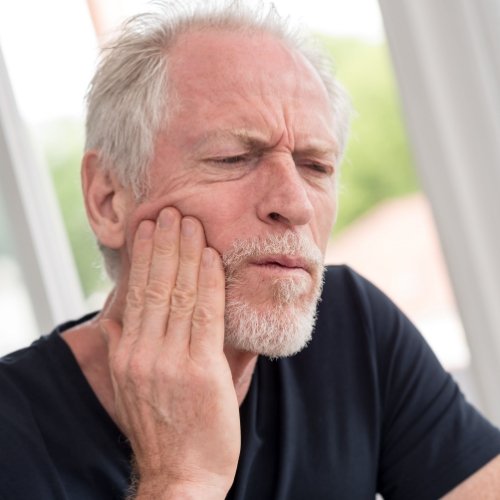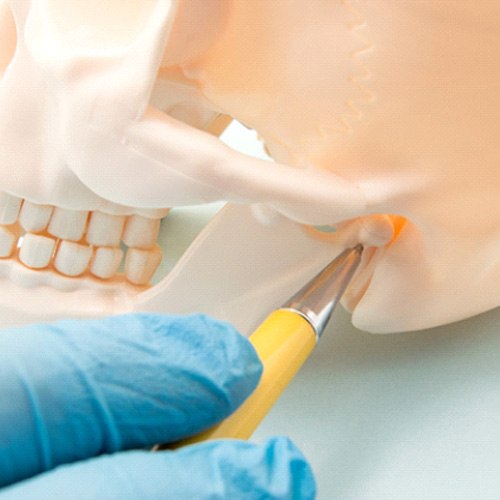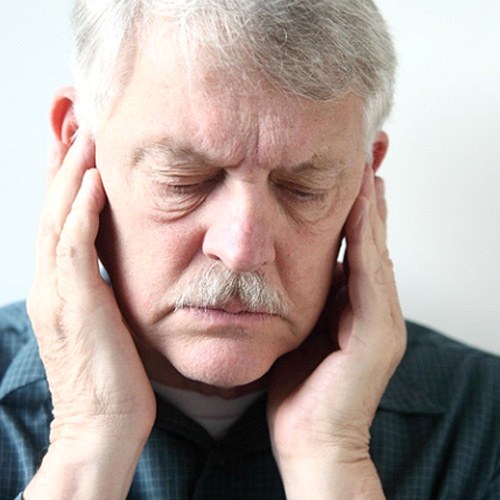TMJ Treatment – Norman, OK
Put a Stop to Your Jaw Pain

Your temporomandibular joints are located in front of your ears. Lined with cartilage, these triangular-shaped joints should move with a smooth, gliding motion. They join your lower jaw and temporal bone, allowing your mouth to open and close easily. However, stress or an improper bite can cause the joints to experience dysfunction. The resulting TMJ disorder, or TMD, can create a variety of mild-to-severe symptoms that can affect your quality of life negatively. Luckily, our team at Bobby J. Carmen, DDS proudly offers TMJ treatment in Norman.
Why Choose Boddy J. Carment, DDS for TMJ Treatment?
- Trained in TMJ Disorders
- Personalized Treatment Plans
- State-of-the-Art Technology
What is TMJ Disorder?

A TMJ disorder is a condition that occurs when the joints function poorly, which can be caused by various issues. Tooth grinding is a common culprit of TMJ dysfunction because it causes inflammation within the joints. TMJ disorders can also cause teeth clenching, creating a vicious cycle.
However, a TMJ disorder can also be caused by a past injury, arthritis, a poor bite, and many other complications. With no treatment, it can significantly affect your oral functions and quality of life, which can even harm your general wellness over time.
Symptoms of TMJ Disorder

A TMJ disorder can cause several symptoms, including:
- Your jaw locking in place.
- Clicking, popping, or grating when opening or closing your mouth.
- Earaches or a ringing in your ears.
- Difficulty while chewing.
- Pain behind your eyes.
- A change in your bite.
Types of TMJ Treatment

TMJ treatment may involve fitting you with a physiologic bite appliance, suggesting ways to alleviate stress, and recommending symptom relief measures. Based on your situation, your dentist may recommend:
Occlusal Splint
A splint is a common and non-invasive solution to stop jaw pain and tooth clenching. A custom-fit appliance trains your jaw to rest comfortably and protects your teeth from the friction of grinding and clenching.
Equilibration/Occlusal Adjustment
Minor adjustments can be made to the chewing surfaces of your molars to improve your bite relationship to take pressure off the joints.
TMJ patients need to avoid chewy or hard food. Take small bites and chew evenly on both sides of the mouth. Good nutrition will help the joints heal more quickly. Improving your posture will also help relieve discomfort. A straight back, relaxed neck, and side-sleeping position are also helpful.
To relieve soreness, light temple and jaw massages will stimulate circulation and relax the muscles. If pain is present, we suggest alternating moist heat and cold for 20 minutes to further increase circulation. Over-the-counter anti-inflammatories or analgesics can be very helpful as well.
For more information about TMJ, TMD, or neuromuscular dentistry, call our Norman, OK dental office at (405) 364-2200. We want to help you receive the relief you deserve. You can also request an appointment online to stop your jaw pain.
